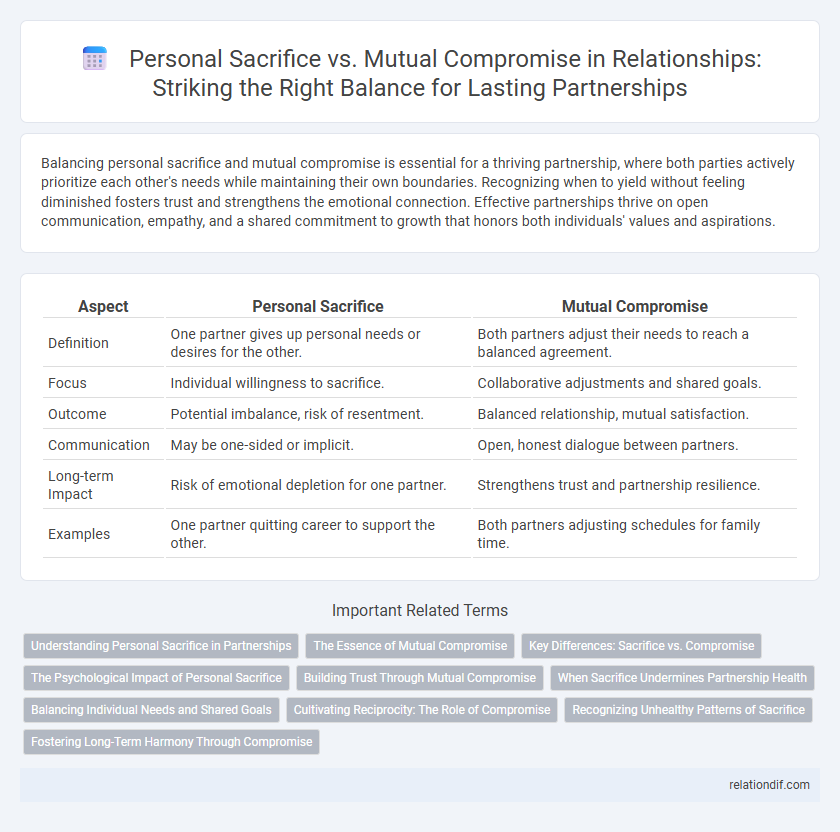Balancing personal sacrifice and mutual compromise is essential for a thriving partnership, where both parties actively prioritize each other's needs while maintaining their own boundaries. Recognizing when to yield without feeling diminished fosters trust and strengthens the emotional connection. Effective partnerships thrive on open communication, empathy, and a shared commitment to growth that honors both individuals' values and aspirations.
Table of Comparison
| Aspect | Personal Sacrifice | Mutual Compromise |
|---|---|---|
| Definition | One partner gives up personal needs or desires for the other. | Both partners adjust their needs to reach a balanced agreement. |
| Focus | Individual willingness to sacrifice. | Collaborative adjustments and shared goals. |
| Outcome | Potential imbalance, risk of resentment. | Balanced relationship, mutual satisfaction. |
| Communication | May be one-sided or implicit. | Open, honest dialogue between partners. |
| Long-term Impact | Risk of emotional depletion for one partner. | Strengthens trust and partnership resilience. |
| Examples | One partner quitting career to support the other. | Both partners adjusting schedules for family time. |
Understanding Personal Sacrifice in Partnerships
Personal sacrifice in partnerships involves willingly giving up individual desires or comforts to support the partner's needs and foster relationship growth. This dedication often strengthens emotional bonds and builds trust by demonstrating commitment beyond self-interest. Recognizing when sacrifice enhances mutual well-being versus when it leads to imbalance is crucial for sustaining healthy, equitable partnerships.
The Essence of Mutual Compromise
Mutual compromise in partnership embodies the essence of balancing individual needs and shared goals, fostering an environment where both parties willingly adjust for collective benefit. This dynamic transcends personal sacrifice by promoting open communication, empathy, and collaborative problem-solving, essential for sustainable relationships. Prioritizing mutual compromise strengthens trust and resilience, enabling partnerships to thrive despite challenges.
Key Differences: Sacrifice vs. Compromise
Personal sacrifice involves one partner yielding their own needs or desires for the sake of the other's benefit, often creating an imbalance in the relationship dynamic. Mutual compromise requires both partners making concessions to achieve a balanced, win-win solution that respects each person's core values and boundaries. Sacrifice can lead to resentment if repeated, while compromise fosters collaboration and strengthens partnership trust.
The Psychological Impact of Personal Sacrifice
Personal sacrifice in partnerships often leads to increased stress, feelings of resentment, and emotional exhaustion, impacting overall mental health. When one partner consistently foregoes their needs, it can create an imbalance that undermines relationship satisfaction and trust. Effective mutual compromise fosters healthier psychological outcomes by promoting equality, respect, and emotional well-being for both individuals.
Building Trust Through Mutual Compromise
Building trust in a partnership hinges on mutual compromise, where both parties willingly adjust their needs to achieve shared goals. Personal sacrifice may create imbalance, but consistent compromise fosters respect, understanding, and collaborative problem-solving. This dynamic strengthens the foundation of trust, ensuring sustainable and harmonious relationships.
When Sacrifice Undermines Partnership Health
Personal sacrifice in a partnership often leads to imbalance when one partner consistently neglects their own needs, resulting in resentment and emotional exhaustion. Mutual compromise fosters partnership health by ensuring both partners' values and boundaries are respected, promoting equality and long-term satisfaction. Sacrifice that undermines partnership health disrupts trust and communication, ultimately weakening the foundation of the relationship.
Balancing Individual Needs and Shared Goals
Balancing individual needs and shared goals in a partnership requires navigating personal sacrifice and mutual compromise with sensitivity and respect. Prioritizing open communication and empathy allows both partners to address their unique desires while fostering a collaborative environment that strengthens the relationship's foundation. Successful partnerships thrive when individual aspirations align harmoniously with collective objectives, creating a sustainable dynamic of give and take.
Cultivating Reciprocity: The Role of Compromise
Cultivating reciprocity in partnership hinges on mutual compromise, which balances personal sacrifice with shared growth. Effective compromise fosters trust and equitable exchanges, strengthening relational bonds and ensuring both parties feel valued. This dynamic interaction promotes sustainable cooperation and long-term commitment.
Recognizing Unhealthy Patterns of Sacrifice
Recognizing unhealthy patterns of personal sacrifice is crucial for maintaining a balanced partnership where mutual respect and well-being are prioritized. Persistent one-sided sacrifice can lead to emotional burnout, resentment, and an erosion of individual identity, signaling the need for honest communication and boundary-setting. Effective partnerships thrive on mutual compromise rather than disproportionate sacrifice, ensuring both partners contribute equitably to the relationship's growth and harmony.
Fostering Long-Term Harmony Through Compromise
Fostering long-term harmony in partnerships relies on mutual compromise, where both parties balance individual desires with collective well-being. Personal sacrifice often risks resentment, while compromise encourages open communication and shared problem-solving, strengthening trust and connection. Prioritizing mutual adjustment creates a sustainable dynamic that supports growth and enduring collaboration.
Personal Sacrifice vs Mutual Compromise Infographic

 relationdif.com
relationdif.com